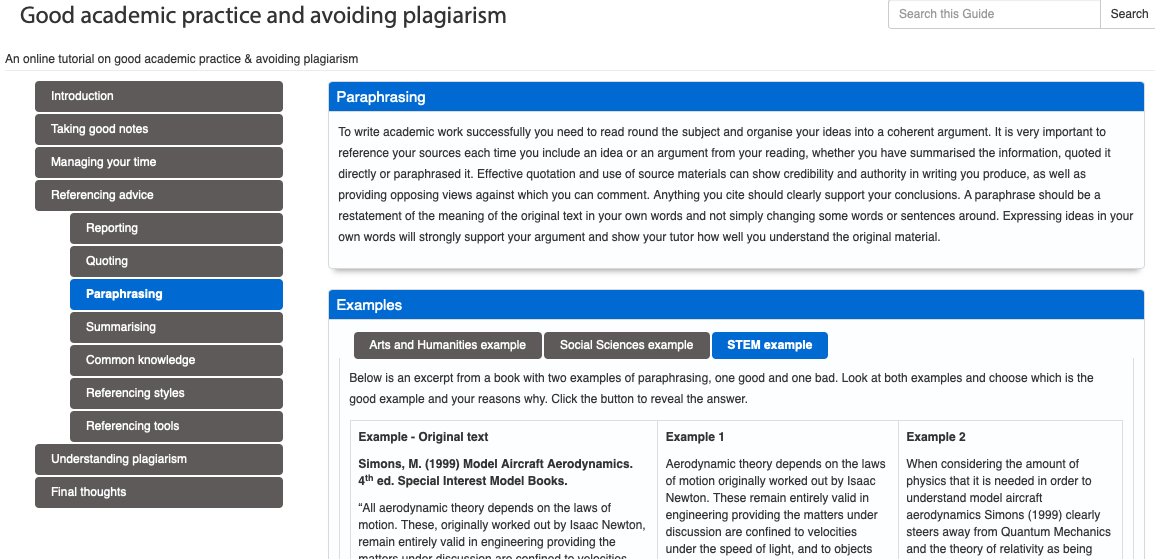Academic Integrity Toolkit
The Good Academic Practice and Avoiding Plagiarism Toolkit
The Cambridge Information Literacy Network (CILN) is a collaboration across Cambridge University Libraries with a broad remit to deliver online teaching and learning activities to support student information literacy. Previous projects delivered by CILN include CamGuides, a resource to help students prepare for their studies in Cambridge (see our article on Open Educational Resources to find out more). In this article Clare Trowell and Lynne Meehan discuss the toolkit developed by CILN on academic practice and plagiarism.

What is the toolkit?
The Good Academic Practice and Avoiding Plagiarism Toolkit is an online resource formed of two parts. The first part is in the form of a LibGuide, supporting students in developing skills and techniques to improve their academic practice. The guide develops an understanding of what plagiarism is, why it matters and how to avoid it - and positively reinforces good academic practice. It is presented as a mixture of text and interactive elements to engage students and, although it is subject-agnostic, does include some subject-related material so that students can see examples from within their own disciplines.
The second part of the toolkit is a 'Plagiarism Quiz', created for use within individual Faculty and Department Moodle courses. The quiz covers all the basic concepts around plagiarism and enables departments to check students' understanding, and then address any areas of concern with further training.
As well as being a standalone resource, we see both the LibGuide and Plagiarism Quiz as elements that can be plugged into other existing resources. For example, the Department of Engineering have a Report Writing Guide, which all students are directed toward when writing their technical reports; the LibGuide and/or quiz can easily be embedded into this. As an alternative example, the quiz could be sent to students ahead of a study skills lecture on plagiarism, as a way of providing flipped content so that the lecture itself can be utilised more for discussion, perhaps around common areas of misunderstanding.
Why did we develop it?
Plagiarism occurs for a variety of reasons. Doro (2014) concludes her article 'Why do students plagiarise?' by pointing out that it might be situations such as "finding the easy way out of an assignment, being under pressure to get good grades, facing time constraints, or receiving too demanding tasks". Students may just want to get a good grade or be frightened of failure. They may have poor time management and thus run out of time to meet deadlines, or they may not be sufficiently interested in the assignment. There can also be confusion as to what constitutes plagiarism.
We developed our toolkit to provide clear guidance on what constitutes plagiarism and help students develop their understanding of good academic practice. The interactive activities within the LibGuide cover good academic writing techniques, such as paraphrasing, as well as giving helpful advice on time management.

"Understanding the reasons behind plagiarism and fostering awareness of the issue among students may help prevent future academic misconduct through increased guidance and support."
Jereb et al., 2018
The Plagiarism Quiz, which can be utilised within an appropriate disciplinary context, is there to test students' knowledge both for their own learning and for teachers to be able to monitor who has engaged effectively with the toolkit.
What are the next steps?
We believe this toolkit will be a useful resource over the current academic year. The ongoing pandemic situation has led to greater emphasis on online learning, which in turn has increased concerns regarding plagiarism. The CILN Good Academic Practice and Avoiding Plagiarism Toolkit is available to support teaching and learning across the University of Cambridge:
Interactive LibGuide freely available here
Please complete this short form if you are a lecturer, faculty or department that would like to use the Plagiarism Quiz in your own Moodle space. Once the form has been submitted, Library staff will be in touch within three working days with instructions on how to import the quiz into your own Moodle course.
Alongside the toolkit there are further Cambridge Libraries resources that may be useful, such as CamGuides, or our Reference Management LibGuide, which incorporates subject-specific referencing advice.
Authors
Clare Trowell

Clare Trowell is the Marshall Librarian, supporting the Faculty of Economics and the Centre for Development Studies.
Lynne Meehan

Lynne Meehan is the Engineering Librarian.
References
Doró, K. (2014) Why do students plagiarise? EFL undergraduates' views on the reasons behind plagiarism. Romanian Journal of English Studies 11(1)
Jereb E., Perc M., Lämmlein B., Jerebic J., Urh M., Podbregar I., et al. (2018) Factors influencing plagiarism in higher education: A comparison of German and Slovene students. PLoS ONE 13(8): e0202252
Cambridge Teaching & Learning Newsletter vol. 2 (issue 1) December 2020
